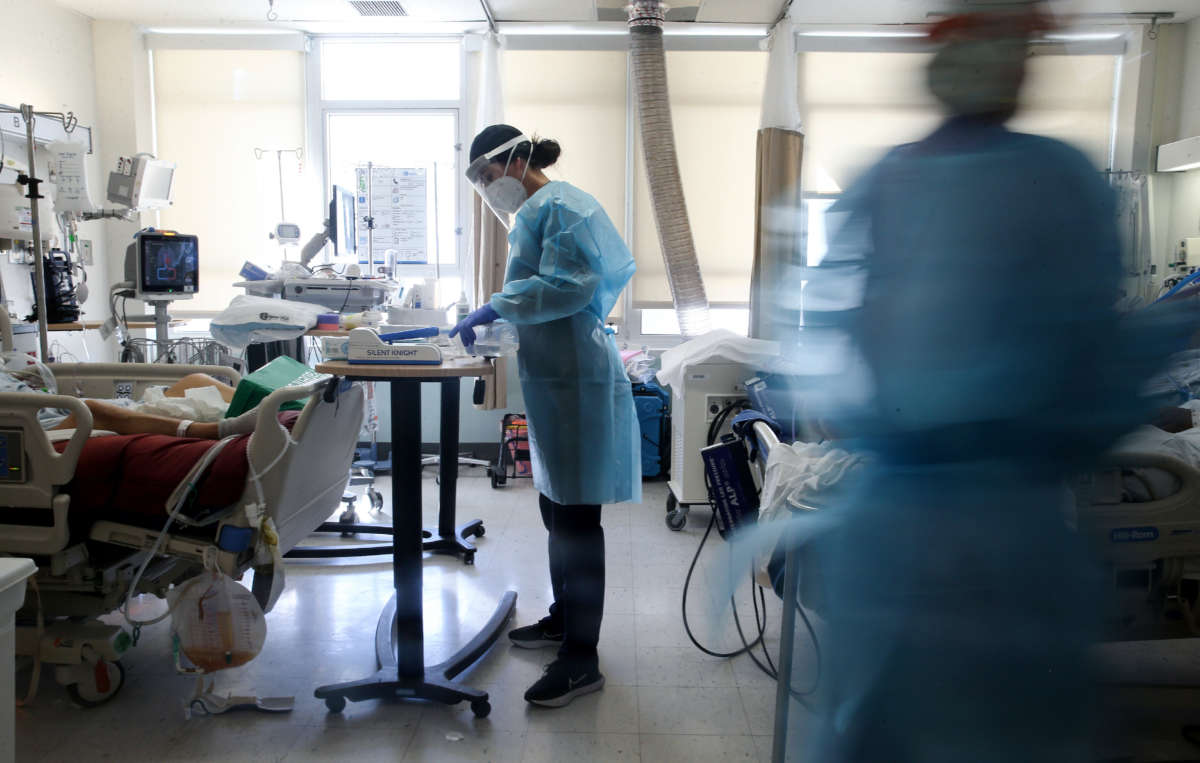Honest, paywall-free news is rare. Please support our boldly independent journalism with a donation of any size.
The largest survey of its kind since the start of the Covid-19 crisis found that 38% of respondents — representing around 100 million Americans — characterized the for-profit U.S. healthcare system as either “expensive” or “broken,” an indication that the pandemic has markedly shifted public opinion.
Gallup and West Health, the two organizations behind the new survey out Tuesday, began the polling process by asking respondents to concisely describe the U.S. healthcare system in their own words. Nearly 40% used the word “expensive” and 13% said the system is “broken” — the two most common descriptors offered by respondents.
“The results stand in stark contrast to findings from just two years ago,” the groups note in their detailed summary of the findings. “In 2019, West Health and Gallup conducted a major survey on U.S. healthcare costs and found that close to half of Americans (48%) believed the quality of care found in the U.S. was either ‘the best in the world’ (13%) or ‘among the very best’ (36%). This was two-and-a-half times the 18% who reported that the quality of care was either ‘the worst in the world’ (3%) or ‘among the worst’ (16%).”
According to the survey, nearly half of Americans say the coronavirus pandemic soured their view of the U.S. healthcare system, which is dominated by large insurance companies and pharmaceutical corporations and imposes some of the highest costs in the world — while achieving some of the worst outcomes.
West Health chief strategy officer Tim Lash stressed that “negative public sentiment” surrounding the healthcare system “did not form overnight or begin with Covid-19.”
“It’s been decades in the making after failed promises by elected officials to do something to help Americans suffering at the hand of high prices for healthcare and prescription drugs,” Lash said. “However, public opinion plays an important role in the policy process, and if policymakers are listening, they have no choice but to act.”
While far from the sole catalyst behind Americans’ changing views, the coronavirus pandemic — which has killed nearly 800,000 people in the U.S., including one in 100 older Americans — has thrown into sharp relief the massive inefficiencies and cruelties of a healthcare system whose primary objective is maximizing profit, not delivering high-quality care to all.
“I think that Covid really illustrated just how dysfunctional the system actually is,” said one survey respondent.
Because a majority of Americans receive health insurance through their employers, the pandemic and resulting economic calamity produced what one study characterized as the “greatest health insurance losses in American history,” with millions being dropped from their plans and forced to seek refuge in badly underfunded public programs or the hard-to-navigate Affordable Care Act exchanges.
Additionally, hospitals have hit Covid-19 patients with massive charges throughout the pandemic, potentially discouraging many from seeking lifesaving treatments.
Gallup and West Health’s new poll, a nationally representative survey of more than 6,600 U.S. adults, found that the percentage of Americans who reported forgoing care due to cost concerns — 30% — tripled in the three months prior to September and October, when the survey was conducted.
Nearly a third of U.S. adults report that they could not afford quality healthcare if they needed it today, up from 18% in February. One in 20 respondents — representing around 12.7 million people — told Gallup and West Health that a friend or family member died over the past year after not receiving treatment because they couldn’t afford it.
Overall, 94% of Americans believe the cost of healthcare in the U.S. is “higher than it should be,” the survey showed.
“Americans have reached their breaking point,” said Shelley Lyford, president and CEO of West Health. “Between March and October, the percentage of people reporting trouble paying for healthcare, skipping treatments, and not filling their prescriptions spiked to their highest levels since the pandemic began, exacerbating another public health threat borne out of cost rather than illness.”
Dan Witters, a senior researcher for Gallup, said in a statement Tuesday that “the sharp worsening in public opinion regarding the affordability of care and medicine is startling, and likely a result of myriad factors related directly and indirectly to the Covid-19 pandemic.”
“From rapidly rising inflation, to deferred care pushed into 2021, to more people having to pay for Covid-19 care itself,” Witters added, “the U.S. healthcare cost crisis is now coming to a head.”
The new survey was published as congressional Democrats continued working to finalize their $1.75 trillion reconciliation package, which includes a patchwork of healthcare provisions including expanded ACA subsidies and a prescription drug plan that was badly weakened by industry-friendly lawmakers. Other popular proposals, including a plan to add dental and vision benefits to Medicare, were dropped during negotiations.
“At a time when one out of four Americans cannot afford their prescription drugs, maybe, just maybe, it’s time we take on the greed of the pharmaceutical industry,” said Sen. Bernie Sanders (I-Vt.), who is pushing for a more ambitious plan to slash skyrocketing medicine costs.
Media that fights fascism
Truthout is funded almost entirely by readers — that’s why we can speak truth to power and cut against the mainstream narrative. But independent journalists at Truthout face mounting political repression under Trump.
We rely on your support to survive McCarthyist censorship. Please make a tax-deductible one-time or monthly donation.
